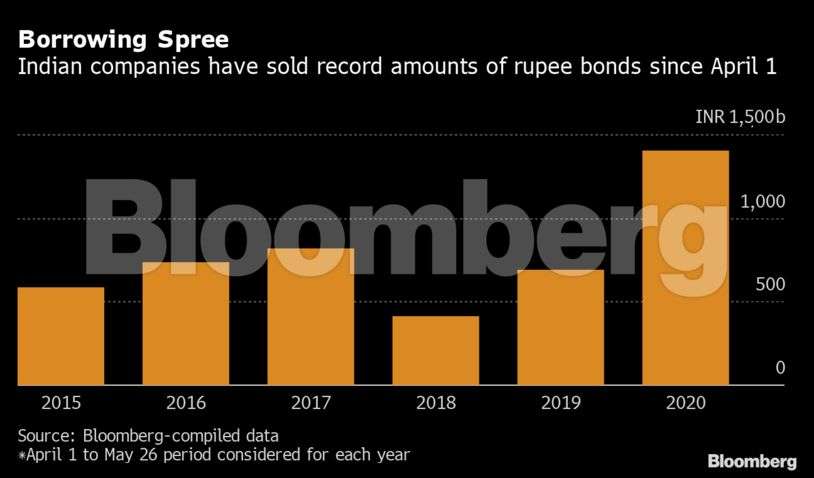Latest rate cut is adding to record corporate bond sales
Policy steps to channel more funds to smaller borrowers have struggled to gain traction.
by Bloomberg
By Divya Patil
India’s latest interest-rate cut last week is already showing signs of adding to record corporate bond sales, as firms build cash buffers to counter the pandemic.
The pipeline of deals is growing with at least three state issuers seeking bids for as much as 110 billion rupees ($1.5 billion) of bonds on Wednesday. That would add to the 1.4 trillion rupees already raised by mainly top-rated businesses in Asia’s third-largest economy through domestic note sales since April 1, the best start to a financial year on record.
Yields on top-rated three-year rupee bonds slid to a 16-year low on Friday, the day Governor Shaktikanta Das reduced the repurchase rate to the least since the measure was introduced in 2000 and pointed to more easing.

The unprecedented offerings underscore a push to stockpile cash as the Covid-19 pandemic hits revenue across Asia’s third-largest economy. And that’s just for the lucky companies that are able to raise money. Policy steps to channel more funds to smaller borrowers have struggled to gain traction, and most lower-rated firms have found creditors increasingly hesitant amid the crisis.
Investor appetite to lend to non triple A companies continues to be weak, said Shameek Ray, head of debt capital markets at ICICI Securities Primary Dealership Ltd.
India’s credit market was roiled by the news late last month that Franklin Templeton’s India unit, a big buyer of high-yield rupee bonds, was shutting six debt funds. There have been growing concerns delinquencies may spike as the economy is on track to shrink for the first time in more than four decades.
The rate cut came after the Reserve Bank of India from end March began funding banks’ purchases of corporate bonds to the tune of 1 trillion rupees via targeted long-term repo operations.
“The frenzy to borrow via rupee bonds was due to the RBI’s cheap liquidity operation,” said Ashish Ghiya, managing director at Derivium Genev, one of India’s largest corporate bond brokers. “Excess liquidity and the policy-rate cut should maintain the issuance momentum.”
To counter the virus-related slowdown, the government this month announced a 21-trillion-rupee economic package, which includes loan guarantees for small businesses, a special credit line for shadow lenders and a suspension of new insolvency proceedings for up to a year.